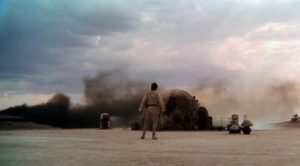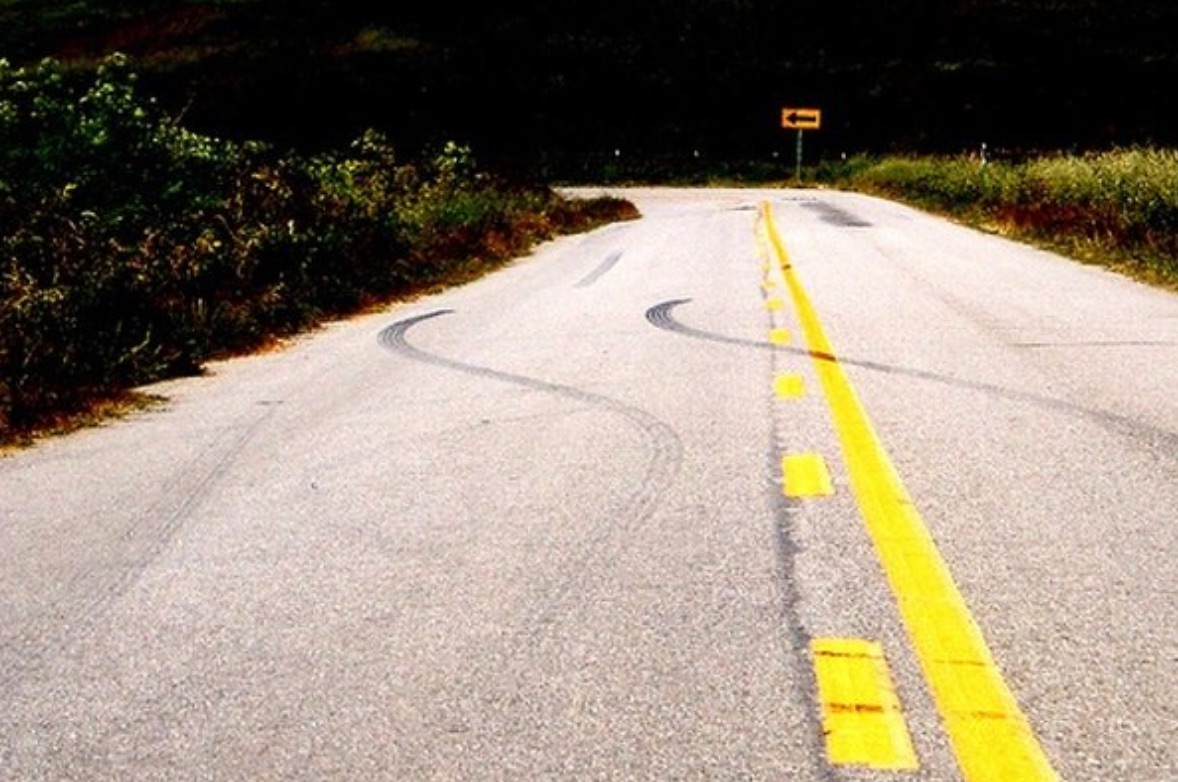On a rainy winter night in 1987, when I was a senior in high school, I drove my parents’ Oldsmobile sedan “over the hill” from the San Fernando Valley to visit my girlfriend at her UCLA dorm room. On my way home I totaled the family car.
More on that in a few paragraphs.
There Is No Back to Normal
I cringe when I hear people talk about “getting back to normal” after the pandemic.
There is no undoing change. You can change again, but you can’t change back.
Associating yesterday’s familiarity with safety and security is understandable – it’s also irrational. The devil we know is not necessarily better than the devil we don’t. Sometimes it makes more sense to fear the known rather than the unknown.
Emotional longing, not judgement, fuels the desire for a “return.” Nostalgia is (see 1:27 of this –>) “the pain from an old wound… it’s a twinge in your heart, far more powerful than memory alone.”
Tell the Truth
The idea of returning home from the coronavirus pandemic to a simpler time in school is a cozy fantasy, a comforting bedtime story for a small child. The truth is darker. School was never normal. Campuses have always been oppressive minefields of physical and psychological violence. Apart from the live shooter drills and the ritualistic bargaining for the bathroom pass, or the passing period shoulder bump that might escalate into a fight at any moment, classrooms have always been dangerous places for honesty, trust, and emotional vulnerability.
The fact is in the fiction. If school really were a safe place, administrators wouldn’t post all those aspirational vision statements: “Smith Elementary is a SAFE PLACE where…”
Let’s get real. Instead of romanticizing the past, or passively wishing things were different, we need to work with what we have in order to create the thing we need.
What we have is a dysfunctional culture in an education institution that (a) isn’t built for the circumstances, and (b) had no plan or process for addressing campus closures.
We also have a technological revolution in communication, and we have millions of people who are hungry for learning the concepts and skills that will help them thrive.
We need a learner-centered, interdisciplinary, transcendent movement that stokes passionate curiosity, craft, and growth.
It’s time to turn into the skid.
The Hero Answers the Call
Sometimes, we find ourselves in a skid. We have choices about how to respond. We don’t have to tell ourselves a panic story; we can focus our attention. After all, now we have a problem to solve, an obstacle to overcome, maybe even a crisis to survive. The skid is our opportunity to innovate – maybe, even, to become a hero.
In story form, it’s easy to romanticize Joseph Campbell‘s construct of the monomyth – the “hero’s journey.” What’s not to love about a protagonist being called to adventure, seeking out wisdom and mentorship, overcoming adversity, and returning home enlightened? Very Luke Skywalker.
When I started teaching high school courses, I wrote a memo to students that I handed out (I was still using ancient Egyptian comms – paper – back then) on the first day of class. The title of the memo was, “Your Opportunity to Be a Hero.” I absolutely meant what I wrote. The choices we make every day that lead us to take charge of our own lives are nothing short of heroic.
But most of the time in real life, the call to adventure isn’t so obvious. As Campbell points out, the call to adventure can be easy to miss, or even downright unpleasant and traumatic. We may not want to hear it.

The pandemic sucks. We’d all rather not be bothered. But make no mistake, this is our call to adventure.
When my girlfriend called that night and invited me to come visit her at UCLA, I was a little nervous. It was pouring. She was way out of my league. I wasn’t supposed to take the car on the freeway without my parents’ permission.
Campbell wrote, “The cave you fear to enter holds the treasure you seek.”
I grabbed my car keys, pulled up my collar, and headed out into the rain.
We Seek Pleasure and Avoid Pain
I took the risk and got behind the wheel that night because of the dopamine rush I received from my girlfriend’s invitation. My brain said, “Gimme more of THAT.”
Where is our motivation to transform school? What are we looking for? What makes us feel good enough to take the risks, have the hard conversations, and sacrifice some sacred cows?
Answering these questions provides the impetus for action, the force we need to change the state of school. The opportunity to create desirable experiences has to outweigh the undesirable experience of the present, and the growing pains that will inevitably come with change.
One of the most widely accepted theories of learning is Edward Thorndike’s Law of Effect, which basically says that we human beings seek pleasure and avoid pain. The Law of Effect is the foundation for operant conditioning, which frames the way we interact with our world and the meaning we interpret from how those interactions make us feel.
Remember that our default is inertia. Q: Why do we have these faculty meetings? A: Because we’ve always had these faculty meetings.
We not only need a desirable force to catalyze change, we also need the resolve to double down when we fear change.
Otherwise, we lean back from the danger we perceive, thinking that we will save ourselves from being hurt. This is how we get hurt. Experienced mountain bikers and skiers know: don’t lean back. If you want to regain control of your speed and direction as you’re flying downhill, lean forward.
Analysis Is a Stall Tactic
We have all the information we need to analyze and act on school’s response to the pandemic and school’s role in our lives moving forward. The earth didn’t open and swallow anyone when the University of California did away with the SAT and the ACT. What else can we explore to help students, families, educators, and communities?
There has never been a more opportune moment for transformation.
To those who would say, “Yeah, but this isn’t a good time…” or, “We need more data…” OK Lumbergh. We get that you like things the way they are. Maybe your legitimacy in the organization depends on creating more studies, or you want a scapegoat instead of leading change.
The problem is that people need help right now. Collecting more survey data and generating more TPS reports will make life harder on everyone in the meantime. These strategies also send a message: Your lived experience is statistically in/valid.
At best, thinking too much muddies the water. Generations of critics and teachers have maligned Hamlet as a moody teenager with a decision-making disorder. In fact, he’s a devoted son who knows from the beginning of the play that he must kill his uncle. But mulling it over takes seven major soliloquies over five acts. Management consultants call this sort of thing “analysis paralysis.”
At least Hamlet is self-aware enough to get mad at his own inability to act more quickly. It’s been almost two years since campuses first closed because of the coronavirus, and schools are still dithering about masks and vaccines, and championing the same old textbook-based curriculum and learning management systems that got us all here in the first place.
You Are What You (Don’t) Do
Hall of Fame football coach Vince Lombardi put it this way: “Watch your actions; they become your habits. Watch your habits; they become your character.”
How do our responses to adversity and trauma train us for future situations and give us a sense of who we are? Will we recover from our wounds? Will we emerge stronger?
Hamlet was either going to be the guy who avenged his father, or the guy who thought about avenging his father but didn’t.
You’re going to be the person who does something innovative with your learning community, or you’re going to be the person who thought about doing something innovative with your learning community, but didn’t. That latter option would be a shame, considering you read this far.
Uninformed Action –> Suboptimal Outcomes
The date with my girlfriend had gone so well. We talked, laughed, ate pizza, and shared the kind of long goodnight kiss that makes no sense if you’ve never had one.
It was still raining as I walked through the parking lot to my car.
I remember smiling to myself and listening to the car radio as I rounded a curve on Sunset Boulevard, when the car’s tires disconnected from the road. Such a weird feeling, floating sideways, effortlessly, fast, in a direction that normal coefficients of friction would never allow. In that moment the car was completely out of my control.
My fear created a rush of adrenaline that triggered an instinct to take control of the situation. I was a man of action! I did exactly the wrong thing. I yanked the steering wheel back in the other direction, toward where I wanted to go, away from the skid. The car whipped around 180 degrees and slammed into a guardrail. Two other cars crashed into me before someone set up cones ahead of the curve and traffic slowed into one lane as it passed.
Turn Into the Skid
What is hanging you up about change? What is the skid that you are resisting? Is it ditching a standardized curriculum that is based on textbooks and tests? Is it the risk of making someone angry or losing your job? What is stopping you from launching an Open-Source Learning Academy or weighing in on how your learning community selects and uses software?
The night was cold. The rain fell harder, pelting me, the drops illuminated by headlights and the flashing red and blue of the police car. The tow trucks finally arrived. So did my father. It was a long night.
Back then, I thought the lesson was that I shouldn’t have driven in the rain to see my girlfriend.
That’s just what our culture wants us to think. Don’t bite the apple. Don’t fly too close to the sun. Curiosity killed the cat.* (*That one is just gross.) Santa knows if you’ve been naughty or nice. And just in case: God is always watching you.
Now I know better. I was absolutely right to drive in the rain to go see my girlfriend. I loved every minute of that night, right up to the moment when I lost control of the car. Even that gave me a valuable life lesson – without it I couldn’t write this post. I have no regrets and I wouldn’t trade any of it for the world.
But I should’ve turned into the skid.
